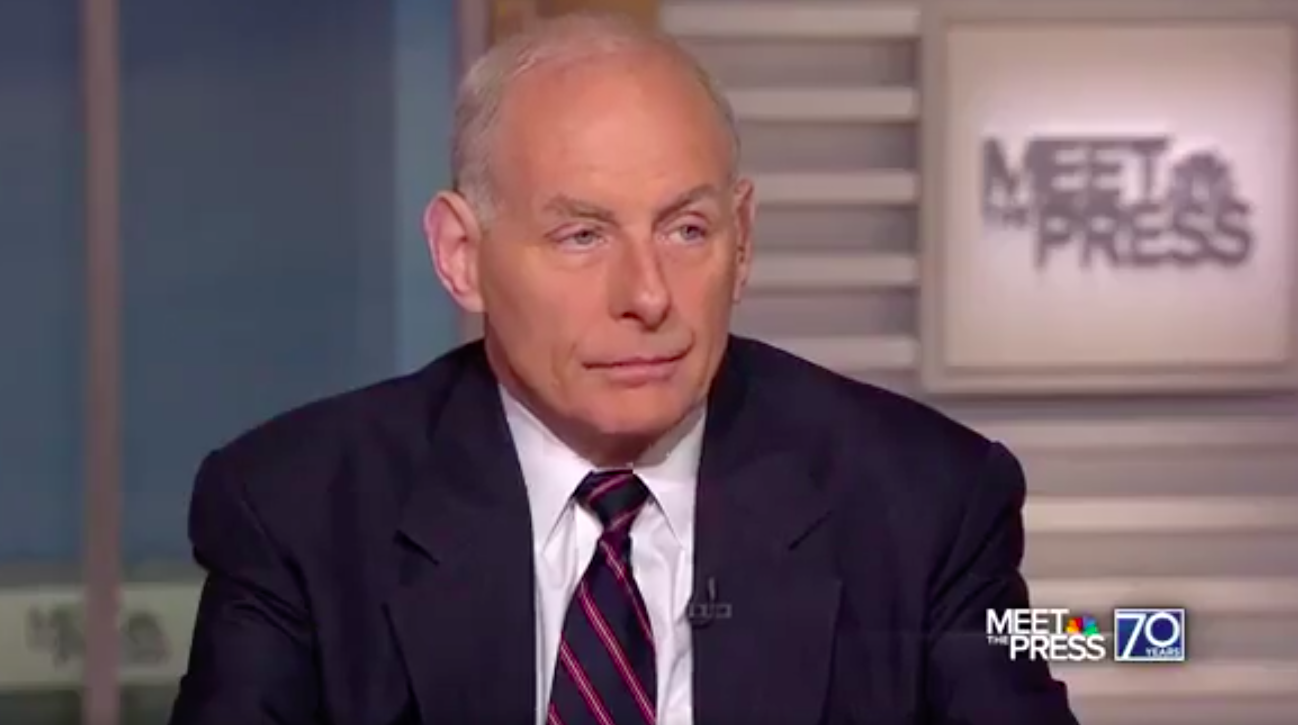Department of Homeland Security secretary John Kelly defended President Trump’s senior adviser and son-in-law Jared Kusher on Sunday, as Kushner came under increased scrutiny following new revelations about his contacts with Russian officials immediately after the 2016 election.
“I know Jared. He’s a great guy, decent guy,” Kelly told NBC’s Chuck Todd on “Meet The Press.”
“His number one, number one interest, really, is the nation. So you know there’s a lot of different ways to communicate, back-channel, publicly with other countries,” Kelly said. “I don’t see any big issue here relative to Jared.”
Kelly was referring to a Washington Post report on Friday in which US officials said Kushner and former national security adviser Michael Flynn met with Russian ambassador Sergey Kislyak in early December to discuss setting up a secret back-channel of communication between the US and the Kremlin. According to officials, Kushner proposed setting up the line of communication through Russian facilities, which would shield it from US monitoring.
Todd pressed Kelly on why Kushner would want to set up a channel with Moscow, which US intelligence agencies concluded meddled in the 2016 election.
Kushner wanted a back-channel "even with an adversary, someone that was, at the time, our own intelligence community had collectively said, 'This is a country that had infiltrated our election,'" Todd said. "Did this show good judgment?"
"Well you know, it was before the government was in place during the transition period, I think," Kelly replied. "And I think any time you can open lines of communication with anyone, whether they're good friends or not so good friends, it's a smart thing to do."
Kushner, who did not disclose the meeting on his security clearance form, is now a subject in the FBI's investigation of Russia's election interference, and whether the Trump campaign colluded with Moscow to undermine Democratic presidential candidate Hillary Clinton.

He also had two previously undisclosed phone calls with Kislyak between April and November of last year, according to Reuters.
Kushner's attorney Jamie Gorelick responded to the Reuters story Friday evening via CNN, saying "Mr. Kushner participated in thousands of calls in this time period. He has no recollection of the calls as described. We have asked (Reuters) for the dates of such alleged calls so we may look into it and respond, but we have not received such information."
National security adviser H.R. McMaster also defended Kushner's actions on Saturday, saying that he was not bothered by the news.
"We have back-channel communications with a number of countries. So, generally speaking, about back-channel communications, what that allows you to do is to communicate in a discreet manner," he told reporters as the president rounded out his first foreign trip.
'Another puzzle piece'
But former intelligence officials and legal analysts threw cold water on that assessment.
While it's not uncommon for low-level staffers to bypass bureaucracy to build consensus in advance of higher-level negotiations, what Kushner did was "substantially different," said Scott Olson, a recently retired FBI agent who ran counterintelligence operations and spent more than 20 years at the bureau.
Kushner "is not seeking a back-channel for a low-level staff exchange," Olson said. "He wants high-level direct-contact communication. This is extremely dangerous because it results in verbal (and therefore undocumented and unwitnessed) agreements, which are binding on governments. Free governments do not work this way. They can't. If they do, they are no longer free."
Olson also added that Kushner's reported request to use Russian facilities goes "way beyond a private server" because it's a conversation "recorded by the opposing party. ... This shows a staggering lack of understanding of the US and its place in the world."

"If you are in a position of public trust, and you talk to, meet, or collude with a foreign power" while trying to subvert normal state channels, "you are, in the eyes of the FBI and CIA, a traitor," said Glenn Carle, a former top counterterrorism official at the CIA for more than two decades.
This latest bombshell is yet "another puzzle piece," said Keith Whittington, a professor of politics at Princeton University. "It provides more reason to worry about the president's motivations when he made inquiries into the progress of [congressional and FBI] investigations."
Whittington added that it will also "presumably be harder for the president to distance himself from his son-in-law than it would be in the case of other staffers like Flynn," which will complicate the administration's efforts at damage control.
"The question isn't whether this line of communication was appropriate or not," said Jens David Ohlin, an associate dean at Cornell Law School and an expert on criminal law. "The question is why Kushner wanted it. Presumably the secret channel would allow the administration to talk to the Russians without the State Department, intelligence agencies, or the rest of the federal bureaucracy knowing about it. Why the need for secrecy from our own government?"
Ohlin suggested that recent developments may point to a "nefarious motive: a radical realignment of US-Russia relations in exchange for Russia intervening in the election to get Trump elected."
He continued: "I sincerely hope that isn't true, because that would be profoundly disturbing."
Natasha Bertrand contributed to this report.

